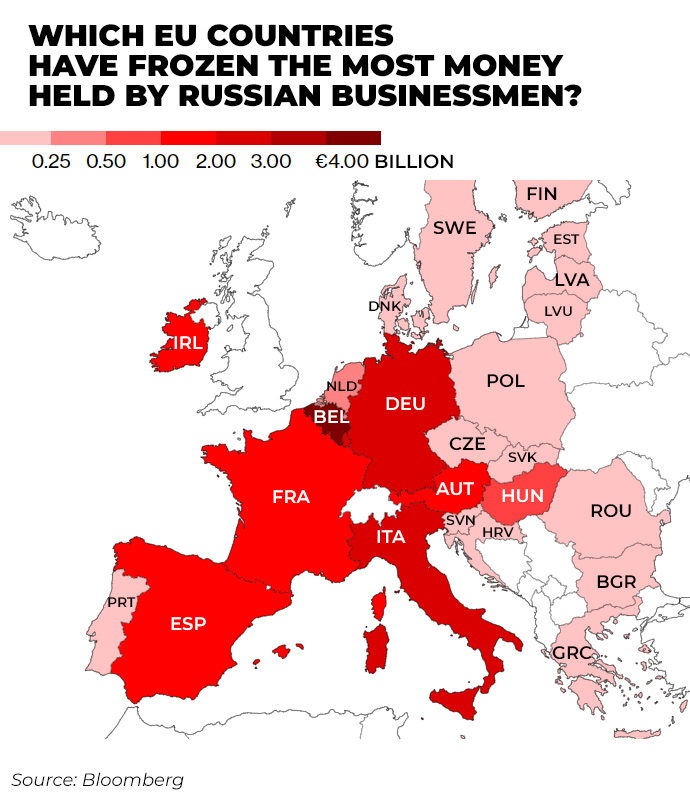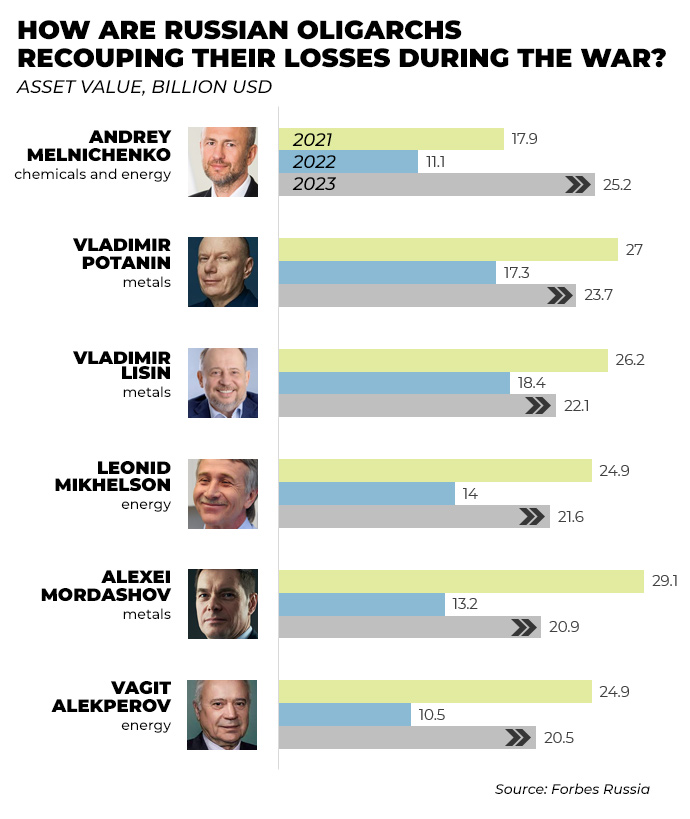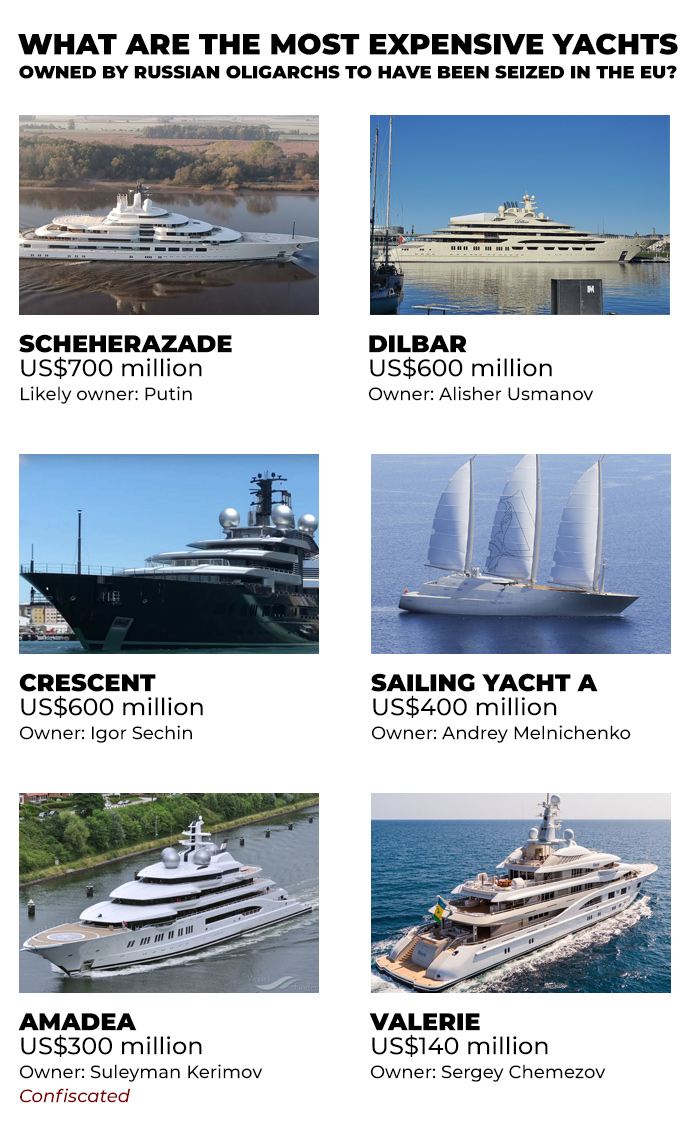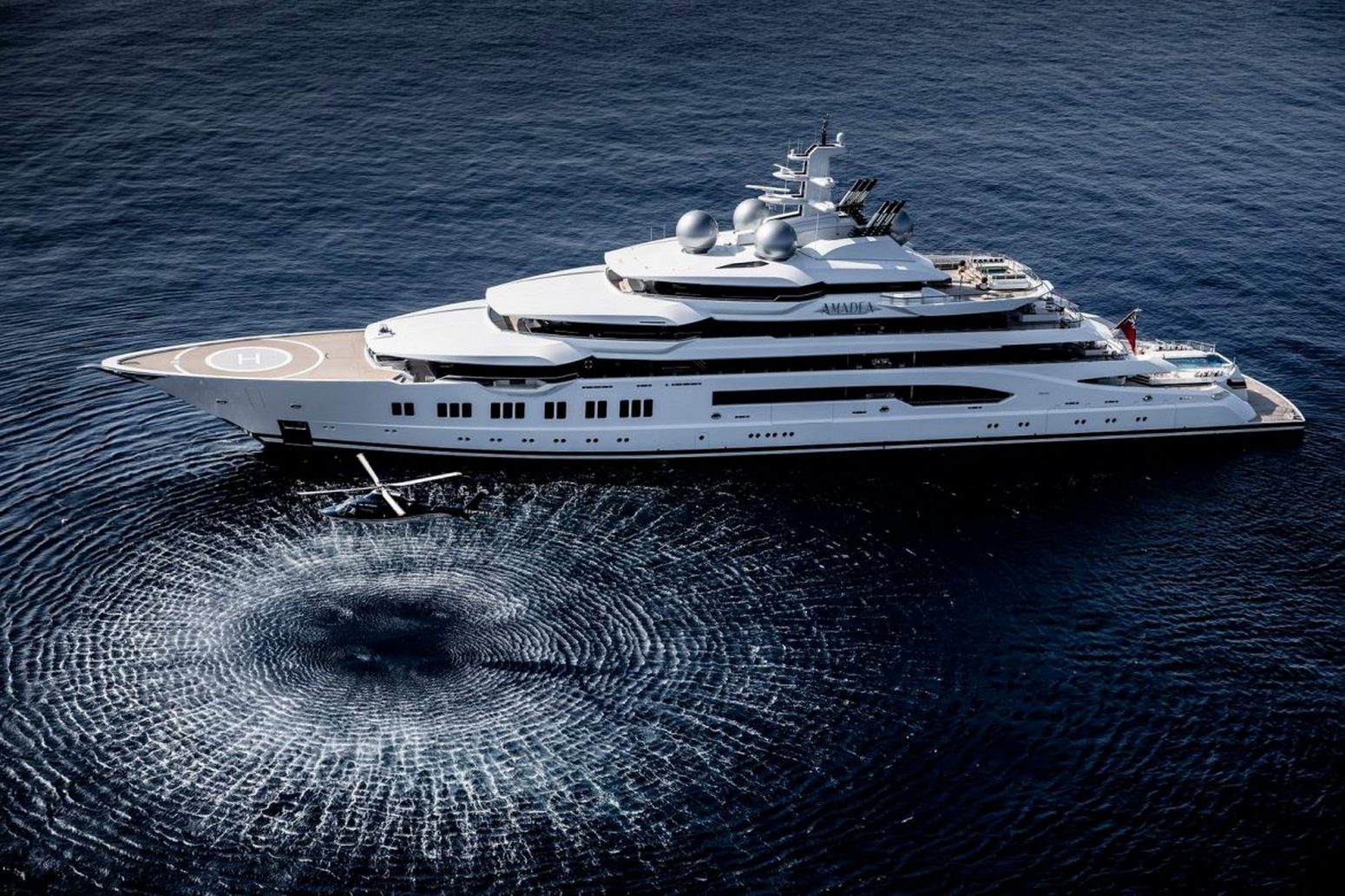Freezing Russian assets will benefit everyone except Ukraine

The Russian elite still owns tens of billions of dollars' worth of yachts, villas and securities. Why are Western countries protecting Russian oligarchs' money?
The Russian elite still owns tens of billions of dollars' worth of yachts, villas and securities. Why are Western countries protecting Russian oligarchs' money?Alfried Krupp was a German industrialist and one of Adolf Hitler's chief associates. His company, Friedrich Krupp AG, produced weapons for the Wehrmacht [the Armed Forces of Nazi Germany], used prisoners of war for forced labour, and seized European manufacturing facilities.
In 1948, a military tribunal sentenced Krupp to 12 years behind bars. But he did not serve his sentence. Three years later, the businessman was released, and later, he was given back his assets and control of his company.
Nobody seems to have learned anything from this story. There is every indication that after the war, the Russian officials and oligarchs who support Putin will also avoid responsibility.
Western countries have frozen tens of billions of dollars’ worth of yachts and villas belonging to the Russian elite, and no one is sure what to do with them. The next step should have been to confiscate the money for Ukraine’s benefit, yet the allies are hesitant to do so.
Riding out the war
The Russian elite’s Achilles heel is its love of luxury. Corrupt money from Russia has been laundered in Western countries for decades. The loot was transformed into houses, apartments, yachts, restaurants and golf clubs.
Once Putin launched the invasion of Ukraine, the Russian oligarchs, politicians and propagandists who owned these assets were sanctioned. Thousands of Russians can no longer enjoy yachting holidays or sell their apartments or securities.
Altogether, Ukraine's allies have frozen US$58 billion worth of private Russian assets. The logic behind such actions is simple: the more assets Putin's establishment loses, the sooner its representatives will force the government to stop the war.

In the early months of the invasion, many hoped for a revolt by the Russian elites – a hope that turned out to be vain, since the war was a lucrative business for them. Russian officials and oligarchs managed to compensate for their losses.
The war has caused a surge in global prices for grain, fertilisers, metals and energy, and Russian companies have profited from that. Andrey Melnichenko, for example, the wealthiest man in Russia, who owns fertiliser producer EuroChem Group and coal producer SUEK (Siberian Coal Energy Company), doubled his wealth in 2022 from US$11 billion to US$25 billion, setting a personal record.
Oligarch Arkady Rotenberg, a close Putin associate, is now US$500 million richer. Yuri Kovalchuk, another oligarch and one of the ideologues of the invasion, whose company provides life insurance to the Russian military, has seen his wealth almost regain its pre-war level.
Vladimir Potanin, whose key asset is the metals giant Norilsk Nickel, has increased his profits by a third to US$24 billion.
Many Western corporations have left the Russian market due to the war, and this has proven to be a real gift for local businessmen. The Russian Forbes list increasingly features the owners of companies that have become rich as a result.
What’s more, Russian oligarchs have acquired some of the Western assets. Potanin took over the French-owned Rosbank, and Viktor Tyryshkin acquired the Czech-owned bank Home Credit. Gas producer Novatek, owned by oligarchs Leonid Mikhelson and Gennadiy Timchenko, has been buying up stakes in major Russian oil and gas projects from Shell and Total.
After plummeting in 2022, the value of Russian billionaires' assets rose from US$353 billion to US$505 billion.

At the same time as Russian businessmen and officials were lining their pockets, their military was killing Ukrainians and destroying Ukrainian infrastructure. The Ukrainian government estimates that Russia has caused damage worth US$700 billion to Ukraine.
Neither sanctions nor war crimes forced the Russian establishment to abandon its support for the Kremlin's policy. The question now is what to do with their frozen assets. They still own tens of billions of dollars’ worth of yachts, villas and securities. The only risk they face is a slight loss in value due to downtime.
Since freezing assets is not delivering results, the West should take the next step: confiscating them and handing them over to Ukraine. The idea of channelling US$58 billion worth of Russian private assets to cover the damage Russia has caused seems fair enough. Yet Western countries are in no hurry to do so.
Frequent use has been made of sanctions in recent decades, but not once has it ever come to large-scale confiscation. Just as during the Krupp tribunal, the G7 countries are afraid to violate the "sacrosanct" right of ownership. However, if nothing is done, the Russian oligarchs will simply get their money back after the war.
"The sanctions are a reaction to the outbreak of war. If the war ends, the grounds for sanctions disappear. The restrictions on Russian oligarchs can be lifted through the courts or by a government decision," explains Iryna Mudra, Ukraine’s Deputy Minister of Justice.
"Many countries have promised to pass laws to confiscate assets once we win. However, there may be no confiscation after victory, because the law is not retroactive," says Yaroslav Sydorovych, co-founder of ANTS, the National Interests Advocacy Network. "If these mechanisms are introduced after the war, there will be no grounds for confiscation, as there will be no legal basis of ongoing armed aggression."
The risk of the aggressor being left unpunished is forcing Western countries to take the first steps towards confiscating Russian funds. The process has turned out to be more complex than Ukrainians had imagined.
Why isn't Russian money confiscated?
Ukraine seizes the assets of Russians involved in the aggression through a process of civil forfeiture. The recovery of each asset requires solid evidence, as the courts consider each case on its own merits. However, following a fast-track procedure, Ukraine can receive a ruling within ten days of submission.
"Ukraine has 24 Anti-Corruption Court rulings on the confiscation of Russian assets worth UAH 80 billion [roughly US$2.17 billion]," says Professor Lidiia Lisovska, Doctor of Economics. "Our law could be a model for Western partner countries."
But the West is in no hurry to develop such policies. The Ukrainian officials involved in international negotiations who spoke to Ekonomichna Pravda admitted that Ukraine’s allies are not ready to introduce rapid confiscation procedures. They are, rather, looking for compromise options.
The European Union is prepared to confiscate Russian assets for Ukraine, but only using criminal rather than civil law, which can entail years of court proceedings. However, the oligarchs will be tried not for sponsoring terrorism or crimes against humanity, but for violating the sanctions regime.
What does this actually mean? Sanctioned oligarchs will have to declare their property, which might then be frozen. If the police determine that an individual failed to declare an apartment or rented it out during the period under restrictions, the property could be confiscated.
This won't take away significant amounts of Russian money. If a Russian oligarch wants to sit out the war, all he has to do is declare his property and do nothing. Then the court will have no grounds for confiscation, and the sanctions will be waived after the war.
Naturally, there will be reckless businessmen who will try to break the law. This happened in Germany. The oligarch Alisher Usmanov failed to declare paintings worth US$5 million on his yacht, and they were confiscated. The same fate befell a Russian lawmaker who attempted to let apartments in Munich.
It was for a sanctions violation like this that the US confiscated US$5.4 million from oligarch Konstantin Malofeev, who had attempted to use the frozen funds. The US is now considering how to channel these funds to Ukraine.
These examples are a drop in the ocean compared to the total assets frozen in these countries. Billions of US dollars’ worth of superyachts alone have been seized. Yet Western partners rarely manage to find grounds to confiscate high-value assets.
Only one of the six Russian superyachts that were seized has actually been confiscated.

The United Kingdom was a favourite haven for Russian oligarchs. Its capital even used to be jokingly referred to as "Londongrad" because of the dominance of Russian businessmen. Local authorities have frozen US$23 billion worth of Russian assets here. However, the UK is even more cautious about confiscation than the EU and the US.
"The UK is not going to confiscate any assets yet, because they have case law. They don't want to set a precedent; then the courts won't have to do the same with frozen assets from other countries," says Vladyslav Vlasiuk, advisor to the Ukrainian President's Office.
On the other hand, the United Kingdom has no intention of lifting sanctions after the war. Vlasiuk says there is a consensus that the assets will be unfrozen only after Russia has paid Ukraine compensation for its losses. However, this scheme has a downside. It means that if Russia does not pay reparations, the oligarchs' money will simply be left in limbo in the UK for years and will not help rebuild devastated Ukrainian cities like Bakhmut or Mariupol.
Read also: "Safe havens" for blood money. Why are Russia's assets not being seized in the West?
There are some positive examples of confiscation. For example, Canada has developed a civil forfeiture mechanism that allows Russian private assets to be seized based on sanctions rather than criminal offences. So far, it is the only country that has dared to do this, thanks to the significant influence of its Ukrainian diaspora.
The Canadian government has been doing all it can to try to recover US$26 million from oligarch Roman Abramovich for Ukraine’s benefit. However, there are few private Russian assets in Canada.
In 2022, efforts were made in the United States to pass a law similar to the Canadian one, but these failed for lack of support. The Americans ultimately decided to act cautiously, confiscating assets only for sanctions violations and money laundering.
Through this scheme, the United States has confiscated US$500 million worth of Russian assets, mostly after the trials against oligarchs Suleiman Kerimov and Viktor Vekselberg. Although this is significantly more than other allies have recovered, the money has yet to be transferred to Ukraine.

Although the process has moved forward, Ukraine is, at best, talking about hundreds of millions of dollars instead of tens of billions. The road to receiving substantial amounts for Ukraine’s reconstruction promises to be a long one, but there is little time left.
Money is needed right now
The war will end sooner or later, and sanctions will be lifted, but no one will compensate Ukraine for its losses unless the West has already confiscated Russians’ private assets. Even if Russian money remains blocked in the West after the war, it will not benefit Ukraine. The rebuilding of Ukraine’s destroyed cities is a matter of urgency, and in the last year and a half, no Russian source of funding has been found.
"Critical infrastructure cannot wait for the war to end. We need Russian money now. We have circumstances like the blowing up of the Kakhovka Hydroelectric Power Plant, with rebuilding projects that require immediate action. The first assets will soon need to be transferred to the compensation mechanism fund we are setting up," says Iryna Mudra.
While Western governments look for compromise solutions, the Russian oligarchs’ lawyers are taking advantage of this weakness and defending their property in the courts.
Usmanov managed to have the search warrants for his residence and yacht revoked in court, and the mother of Russian terrorist and Wagner Group financier Yevgeny Prigozhin was able to have sanctions against her lifted through a court. This could set a precedent for lifting sanctions against other family members of Russian politicians and business leaders, who often register property in the names of relatives.
Some Russian oligarchs have dodged personal restrictions altogether. For example, Vladimir Lisin, one of Russia's wealthiest men, is still not under sanctions, even though his company supplies steel to the Russian military-industrial complex.
"About 10,000 Russians have been sanctioned since 2014. However, only 500 are sanctioned by all of Ukraine's allies simultaneously. The lack of coordination of sanctions lists reduces their effectiveness," says Professor Oksana Yurynets, Doctor of Economics.
"Alexey Likhachev, the CEO of Rosatom [the Russian state nuclear energy corporation] who led the seizure of the Zaporizhzhia Nuclear Power Plant, is still not under EU sanctions. Australia decided to sanction him in April 2022, but the EU countries have been dragging their feet for sixteen months."
Freezing Russian assets in Western countries is the only way to bring the aggressor to justice for its devastation of Ukraine. However, it will only be when the world starts to get tougher on Russian money that the first foundations of new cities for Ukrainian refugees will be laid. The Ukrainian military is buying time to find a mechanism at the cost of their lives. It’s up to our Western allies now.
This article was written as part of an ANTS project entitled Russian Assets as a Source of Recovery of the Ukrainian Economy, implemented in cooperation with the National Democratic Institute (NDI) with financial support from the National Endowment for Democracy (NED).
Translation: Artem Yakymyshyn
Editing: Teresa Pearce